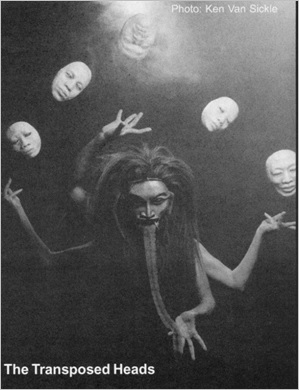
How did you get this project?
Julie brought the project to me. This included a lyricist and playwright called Sidney Goldfarb; he’s a poet who lives up in the mountains in Colorado. He’s an elusive guy and we tried to convince him to turn this very philosophical piece of Thomas Mann into a musical that took place in India. What excited me about it was the opportunity to use American popular forms, but also use classical Indian rhythmic structures as well as ecclesiastical religious Indian modes for scales. I had to put this within the realm of an American musical, which seemed like an impossible thing to do.
What kind of subject matter were you dealing with here?
You’re dealing with the friendship between two men, the deepest form of close male friendship, but not homosexual. A love triangle that deals with these two men and a young woman, Sita. It’s the essentially difference between essence and image.
There’s a lot of comedy, sex, and violent material here. At one point the two characters in a cave in India, through the intervention of Kali, both chop their heads off because they both feel they are unworthy of having this woman. She then decide which guy she wants, so she puts one head on the other guy’s body and the other guy’s head on the other guy’s body. One guy, who had a great physique but wasn’t that intelligent or educated, he didn’t have it all for her. So she took the intelligent head and put it on the sexy body, thinking she had it all. The problem in the story was that eventually, because the body and the head were working so well together with this girl, they’d have the greatest sex over and over and over again and eventually he became tired of her. Because he had such a great body, he wasn’t interested in exercising or doing anything more because his head was an intellectual head. Eventually the guy with the intellectual head and the perfect body lost his body; he became really disgusting, fat, sagging, and he lost the yearning and his intelligence because he had this body to drag around with him.
At the end, the other guy, who was ostracized and left out in the woods, became the perfect specimen, and then she tried to find him. Eventually you realize that it’s this crazy cycle and you can never find the perfect person. It’s a very significant tale that we did as a musical.
Can you explain what you tried to achieve here?
It’s a marriage between American jazz forms and popular singing. There’s a concept that’s called dance theater, which is complete theater where people sing, dance, act, and they’re musicians. In many Asian cultures you have this kind of dance theater. We wanted to bring this to an American musical possibility.
What did you learn or accomplish through this project?
I learned that you have to spend more time on the proper casting. We were rushed into a situation where we had two months to do all the casting. I just didn’t find the right people for the job, but I did find that there’s a tremendous world out there where you can write music that doesn’t have to sound like Broadway that can really translate to a Broadway audience.